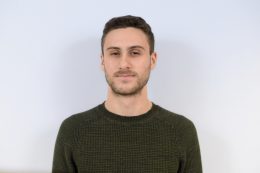
In the early 1940s in Hungary, my grandmother and grandfather, then teenagers, were dating. By 1944, my grandfather had been sent to a forced labor camp and my grandmother to Auschwitz. They wouldn’t see each other again until their reunion years later in the state of Israel.
My grandmother recalls the feeling of helplessness following her liberation from the death camp. The Nazis had robbed her of her childhood, of her mother and her sister. In the aftermath of the war, she was almost alone in the world: no country, no parents, relying on the kindness of strangers in a heartless world. “The Germans took everything and left me naked,” she once told me. “So I try to hold on to everything I can.”
Family is very important to my grandparents for obvious reasons. They are aware of the contingency of life, how unexpected forces beyond their control could upend their lives in a moment. So they hold onto everything they can. If that means being extra worried, extra attentive, extra protective, then so be it. The need for constant vigilance is but one scar from a dark time that has left many more.
Now, all over our planet, there are refugees for whom the world is a dark and dangerous place. Though their circumstances are different from that of my grandparents, their fear and their loneliness are the same. We cannot help them all, but it’s important to do what we can. Americans from all walks of life recognize that helping others will not only heal them, but will heal us too, and that engaging in repairing the world is a holy act that takes us beyond ourselves.
In the course of accepting our responsibility to help the lost and abandoned of our world, it is far too easy to dismiss those who are suspicious of other human beings as backward, bigoted, racist or any other kind of unhelpful epithets. It’s an inappropriate way to approach our fellow Americans. If my family’s history taught me about the importance of accepting into our homes those in need, it has also taught me about fear; the Holocaust is a brutal story about the depths of human evil which seem to have no end. My grandparents benefited from the kindness of some strangers, yes, but they also suffered unimaginably at the hands of others. The suspicion of others is not only a component of human history, it is our natural condition.
The fear of strangers is as much a part of our humanity as our ability to extend the boundaries of our moral concern beyond our families and our country. Human beings are chiefly concerned with security; security for themselves, but more importantly, security for the ones they love. And so fear itself has a moral component, the duties and responsibilities we have to protect those that matter to us most.
This makes it more urgent, not less, that we have an honest conversation about the benefits of an open and just society. It means we need to understand the fears of our fellow Americans. If you talk to them without judgment, but with empathy, with a heart filled less with scorn than with understanding, they’ll listen. They may be scared. I’m scared, too. Life is unpredictable, and I don’t understand everything. But I do know one thing: Fear is understandable, but it has no end. Bravery, on the other hand, has the power to change our world.
In the Jewish legal tradition, which Adolf Hitler failed to eradicate, there is a principle of particular importance to me: “If one should save another, it is as if they have saved a whole world,” as it is written in the Talmud. Lately, we have become uncertain about moral truth, about what is good and what is not, about whether good even exists at all. Modern life has degraded our sense of meaning. So, cynicism, the conviction of meaninglessness, has been allowed to take root. An affirmation of our dedication to the value of human life could breathe new life into our society.
We can take the hands of strangers despite our fears of the unknown and remind ourselves of what exactly makes our country great. In doing so, we will, at the very least, save their worlds. Along the way, maybe we’ll save ours too.
Aaron Bondar is a sophomore double-majoring in economics and political science.


